Product Description
Motor Speed Reducer R57 RF57 Motor Inline Shaft Helical Agricultural gear grove brass miniature Speed worm Reducer gearbox China Industrial
Application of worm Reducer
A worm reducer is a type of gear reducer that uses a worm gear to transmit power between 2 shafts. Worm gears are characterized by their high torque and low speed, which makes them ideal for applications where precision and control are important.
Worm reducers are used in a wide variety of applications, including:
- Lifts and elevators: Worm reducers are used in the drive mechanisms of lifts and elevators to provide high torque and low speed. This allows the lifts and elevators to move smoothly and precisely, even when carrying heavy loads.
- Machine tools: Worm reducers are used in machine tools, such as lathes and milling machines, to provide smooth, precise motion. This allows the machine tools to cut and shape materials accurately and efficiently.
- Conveyors: Worm reducers are used in conveyors to move materials from 1 place to another. The high torque of the worm reducers allows the conveyors to move heavy loads smoothly and efficiently.
- Mixers: Worm reducers are used in mixers to mix ingredients together. The high torque of the worm reducers allows the mixers to mix ingredients quickly and thoroughly.
- Sawmills: Worm reducers are used in sawmills to saw logs into lumber. The high torque of the worm reducers allows the sawmills to saw logs quickly and efficiently.
- Wind turbines: Worm reducers are used in wind turbines to convert the rotational motion of the blades into electrical energy. The high torque of the worm reducers allows the wind turbines to generate electricity even in low wind conditions.
Worm reducers are a versatile and essential part of many machines and devices. They are used in a wide variety of applications, and their high torque and low speed make them ideal for applications where precision and control are important.
Here are some of the benefits of using worm reducers:
- High torque: Worm reducers can provide high torque, which makes them ideal for applications where heavy loads need to be moved.
- Low speed: Worm reducers can provide low speed, which makes them ideal for applications where precision and control are important.
- Smooth operation: Worm reducers operate smoothly, which makes them ideal for applications where noise and vibration need to be minimized.
- Compact size: Worm reducers can be made in a compact size, which makes them ideal for applications where space is limited.
- Low maintenance: Worm reducers require very little maintenance, which makes them a cost-effective option for long-term use.
Worm reducers are a reliable and efficient type of gear reducer that can be used in a wide variety of applications. If you are looking for a gear reducer that can provide high torque, low speed, smooth operation, compact size, and low maintenance, then a worm reducer is a good choice.
/* January 22, 2571 19:08:37 */!function(){function s(e,r){var a,o={};try{e&&e.split(“,”).forEach(function(e,t){e&&(a=e.match(/(.*?):(.*)$/))&&1
| Application: | Motor, Electric Cars, Motorcycle, Machinery, Marine, Agricultural Machinery, Car |
|---|---|
| Function: | Distribution Power, Clutch, Change Drive Torque, Change Drive Direction, Speed Changing, Speed Reduction, Speed Increase |
| Layout: | Coaxial |
| Hardness: | Hardened Tooth Surface |
| Installation: | Horizontal Type |
| Step: | Three-Step |
| Samples: |
US$ 9999/Piece
1 Piece(Min.Order) | |
|---|
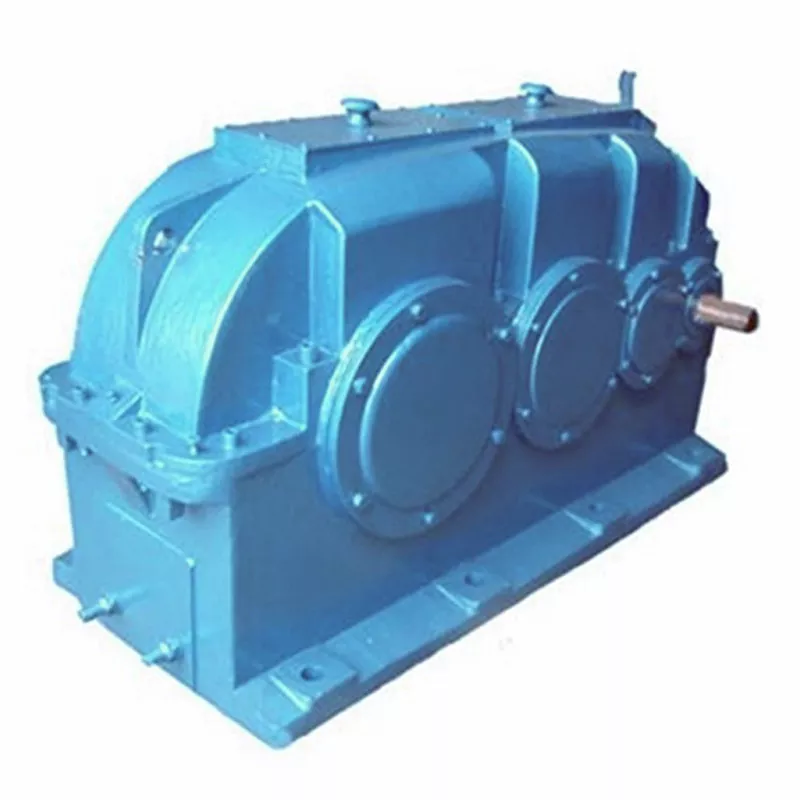
Considerations for Choosing Lubrication for Industrial Gearboxes
Choosing the right lubrication for industrial gearboxes is crucial for ensuring optimal performance, longevity, and efficiency. Several important considerations should be taken into account when selecting lubrication:
1. Operating Conditions: The operating environment, including temperature, humidity, and contaminants, affects the choice of lubrication. Extreme temperatures may require lubricants with specific temperature ranges.
2. Load and Torque: The magnitude of load and torque influences the selection of lubrication with appropriate viscosity and film strength to provide effective protection under varying conditions.
3. Speed and RPM: Gearbox speed and RPM determine the lubrication’s ability to maintain a stable lubricating film between gear teeth and other components.
4. Lubrication Interval: Consider the required lubrication frequency and intervals. Some applications may demand lubricants with longer service intervals to minimize downtime.
5. Gearbox Type: Different gearbox designs, such as helical, bevel, or worm, may have varying lubrication requirements due to differences in gear engagement and motion.
6. Compatibility: Ensure the selected lubricant is compatible with the gearbox materials, seals, and components to prevent degradation or damage.
7. Contamination Control: Lubricants should possess effective anti-contamination properties to minimize the risk of particles or debris affecting gearbox performance.
8. Water Resistance: In applications exposed to water or moisture, water-resistant lubricants help prevent corrosion and maintain proper lubrication properties.
9. Additives: Some lubricants include additives that enhance performance, such as anti-wear, anti-foam, and extreme pressure additives.
10. Environmental Considerations: Evaluate the environmental impact of the chosen lubrication, including disposal and potential harm to the ecosystem.
11. Manufacturer Recommendations: Follow the gearbox manufacturer’s recommendations and guidelines for lubrication type, viscosity, and maintenance practices.
Choosing the appropriate lubrication involves a comprehensive assessment of these factors, ensuring that the lubricant selected is well-suited for the specific demands of the industrial gearbox and its application.
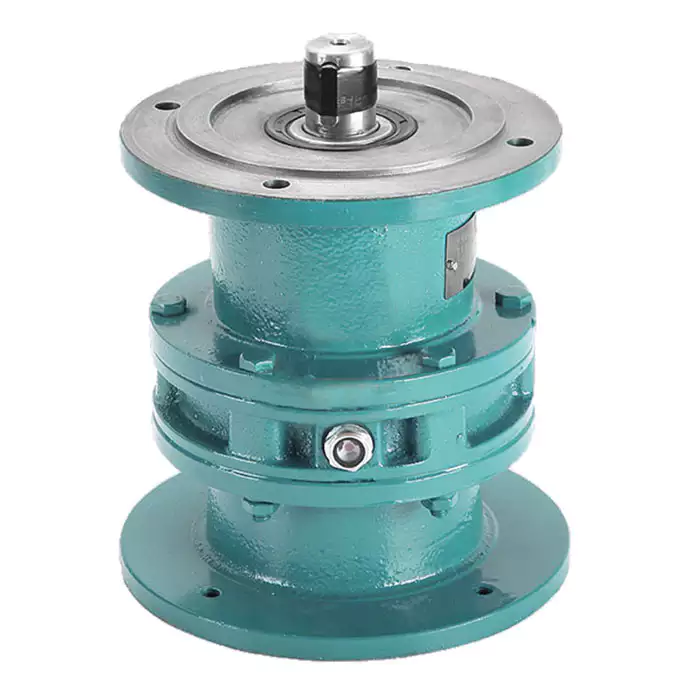
Drawbacks and Limitations of Industrial Gearbox Systems
While industrial gearbox systems offer numerous benefits, they also come with certain drawbacks and limitations:
1. Size and Weight: Industrial gearboxes can be large and heavy, which may require additional space and structural support in machinery design.
2. Efficiency Loss: Gearboxes can introduce energy losses due to friction and heat generation, especially in applications with high-speed rotations.
3. Maintenance Requirements: Gearboxes need regular maintenance to ensure optimal performance, including lubrication, gear inspections, and potential replacement of worn components.
4. Cost: The design, manufacturing, and installation of industrial gearbox systems can be expensive, especially for custom or specialized solutions.
5. Noise and Vibration: Gearboxes can generate noise and vibration, which may require additional measures for noise reduction and vibration damping.
6. Limited Operating Range: Each gearbox has a specific torque and speed range where it operates efficiently. Operating outside these limits can lead to reduced performance and potential damage.
Despite these limitations, industrial gearbox systems remain essential components in many industries due to their ability to efficiently transmit power, control motion, and adapt to various applications.
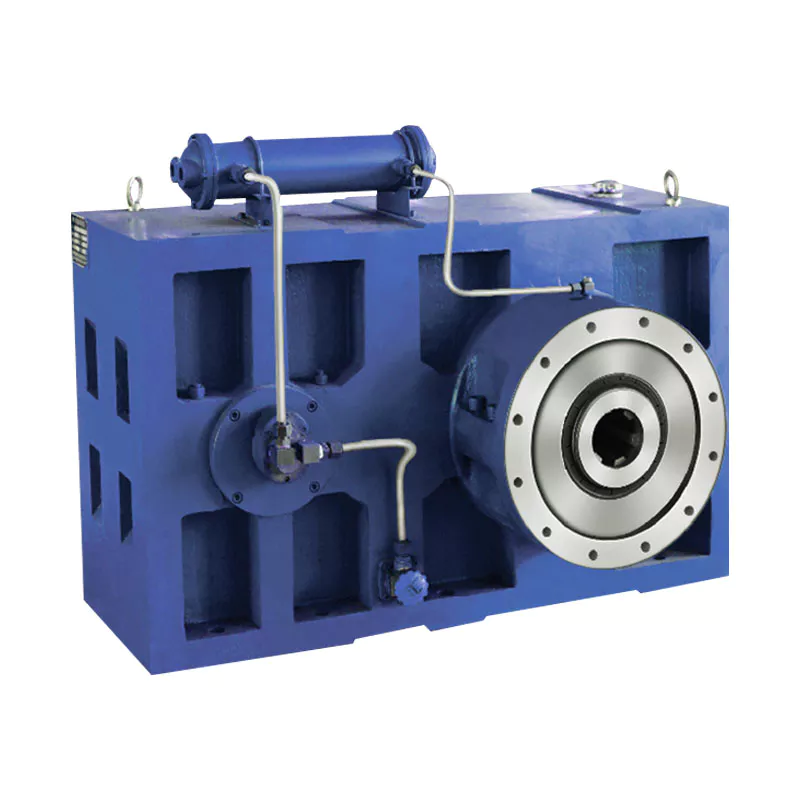
Industries Using Industrial Gearboxes
Industrial gearboxes play a crucial role in various industries, enabling efficient power transmission and motion control. Some of the industries that commonly utilize industrial gearboxes for their operations include:
- Manufacturing: Industrial gearboxes are used in manufacturing processes for tasks such as material handling, assembly lines, and machine tools.
- Automotive: Gearboxes are essential components in automotive manufacturing, used in transmissions, engines, and other critical systems.
- Construction: Construction machinery relies on gearboxes for tasks like lifting, excavating, and moving heavy materials.
- Mining: Mining equipment utilizes gearboxes for drilling, crushing, conveying, and other demanding operations.
- Energy: Power generation facilities, including wind turbines, hydroelectric plants, and fossil fuel power plants, use gearboxes for efficient energy conversion.
- Marine: Gearboxes are crucial in marine applications, such as ship propulsion systems and offshore equipment.
- Agriculture: Farming machinery, like tractors and harvesters, relies on gearboxes for various tasks like plowing, planting, and harvesting.
- Food and Beverage: Gearboxes are used in food processing and packaging equipment, ensuring precise and efficient production.
- Textile: The textile industry employs gearboxes in machinery for weaving, spinning, and fabric processing.
- Pulp and Paper: Gearboxes play a role in papermaking processes, including pulping, drying, and rolling.
These are just a few examples of industries that heavily rely on industrial gearboxes to optimize their operations and ensure the efficient functioning of their machinery and equipment.


editor by CX 2024-05-17
China Hot selling Small Industrial Worm Geared Motor Gearboxes Reducer planetary gearbox
Product Description
RV series Characteristics
- RV – Sizes:–150
- Input Options: with input shaft, With Square flange,With Input Flange
- Input Power 0.06 to 11 kW
- RV-Size from 030 to 105 in die-cast aluminium alloy budy and over 110 in cast iron
- Ratios between 5 and 100
- Max torque 1550 N.m and admissible output radial loads max 8771 N
- Aluminium units are supplied complete with synthetic oil and allow for universal mounting positions, with no need to modify lubricant quantity
- Worm wheel: Copper (KK Cu).
- Loading capacity in accordance with: ISO 9001:2015/GB/T 19001-2016
- Size 030 and over are painted with RAL 5571 blue
- Worm gear reducers are available with diffferent combinations: NMRV+NMRV, NMRVpower+NMRV, JWB+NMRV
- NMRV, NRV+VS,NMRV+AS,NMRV+VS,NMRV+F
- Options: torque arm, output flange, viton oil seals, low/high temperature oil, filling/drain/breather/level plug,Small gap
Basic models can be applied to a wide range of power reduction ratios from 5 to 1000.
Warranty: One year from date of delivery.
| WORM GEARBOX | |||||
| SNW SERIES | Output Speed Range: | ||||
| Type | Old Type | Output Torque | Output Shaft Dia. | 14rpm-280rpm | |
| SNW030 | RV030 | 21N.m | φ14 | Applicable Motor Power: | |
| SNW040 | RV040 | 45N.m | φ19 | 0.06kW-11kW | |
| SNW050 | RV050 | 84N.m | φ25 | Input Options1: | |
| SNW063 | RV063 | 160N.m | φ25 | With Inline AC Motor | |
| SNW075 | RV075 | 230N.m | φ28 | Input Options2: | |
| SNW090 | RV090 | 410N.m | φ35 | With Square flange | |
| SNW105 | RV105 | 630N.m | φ42 | Input Options3: | |
| SNW110 | RV110 | 725N.m | φ42 | With Input Shaft | |
| SNW130 | RV130 | 1050N.m | φ45 | Input Options4: | |
| SNW150 | RV150 | 1550N.m | φ50 | With Input Flange |
Starshine Drive
ZheJiang CHINAMFG Drive Co.,Ltd,the predecessor was a state-owned military mould enterprise, was established in 1965. CHINAMFG specializes in the complete power transmission solution for high-end equipment manufacturing industries based on the aim of “Platform Product, Application Design and Professional Service”.
CHINAMFG have a strong technical force with over 350 employees at present, including over 30 engineering technicians, 30 quality inspectors, covering an area of 80000 square CHINAMFG and kinds of advanced processing machines and testing equipments. We have a good foundation for the industry application development and service of high-end speed reducers & variators owning to the provincial engineering technology research center,the lab of gear speed reducers, and the base of modern R&D.
Our Team
Quality Control
Quality:Insist on Improvement,Strive for Excellence With the development of equipment manufacturing indurstry,customer never satirsfy with the current quality of our products,on the contrary,wcreate the value of quality.
Quality policy:to enhance the overall level in the field of power transmission
Quality View:Continuous Improvement , pursuit of excellence
Quality Philosophy:Quality creates value
3. Incoming Quality Control
To establish the AQL acceptable level of incoming material control, to provide the material for the whole inspection, sampling, immunity. On the acceptance of qualified products to warehousing, substandard goods to take return, check, rework, rework inspection; responsible for tracking bad, to monitor the supplier to take corrective measures
to prevent recurrence.
4. Process Quality Control
The manufacturing site of the first examination, inspection and final inspection, sampling according to the requirements of some projects, judging the quality change trend;
found abnormal phenomenon of manufacturing, and supervise the production department to improve, eliminate the abnormal phenomenon or state.
5. FQC(Final QC)
After the manufacturing department will complete the product, stand in the customer’s position on the finished product quality verification, in order to ensure the quality of
customer expectations and needs.
6. OQC(Outgoing QC)
After the product sample inspection to determine the qualified, allowing storage, but when the finished product from the warehouse before the formal delivery of the goods, there is a check, this is called the shipment inspection.Check content:In the warehouse storage and transfer status to confirm, while confirming the delivery of the product
is a product inspection to determine the qualified products.
Packing
Delivery
/* January 22, 2571 19:08:37 */!function(){function s(e,r){var a,o={};try{e&&e.split(“,”).forEach(function(e,t){e&&(a=e.match(/(.*?):(.*)$/))&&1
| Application: | Motor, Machinery, Marine, Agricultural Machinery |
|---|---|
| Function: | Distribution Power, Change Drive Torque, Change Drive Direction, Speed Changing, Speed Reduction |
| Layout: | Corner |
| Hardness: | Hardened Tooth Surface |
| Installation: | Horizontal Type |
| Step: | Single-Step |
| Customization: |
Available
| Customized Request |
|---|
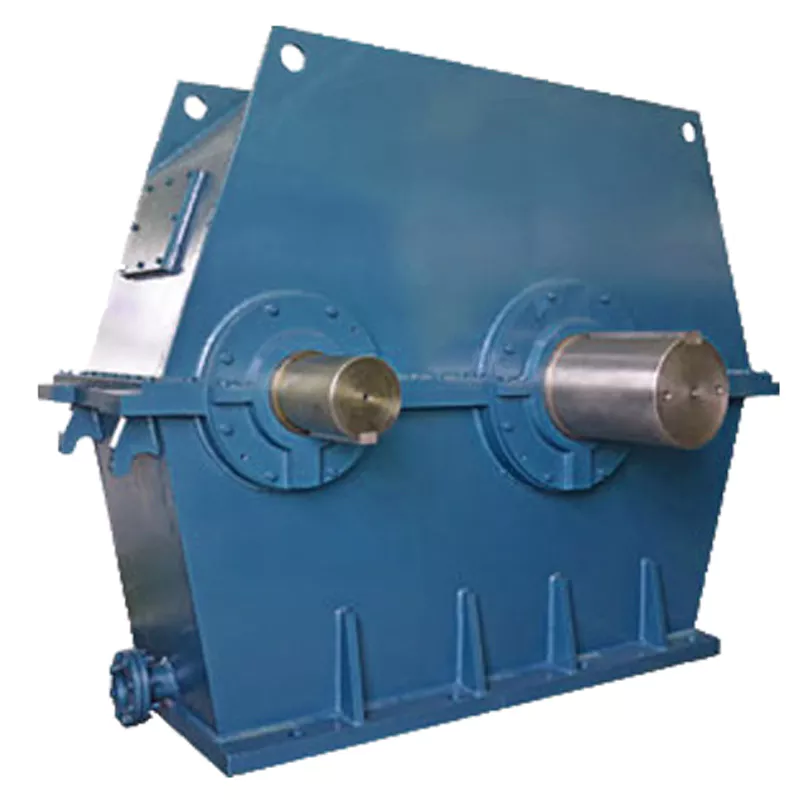
Customization of Industrial Gearboxes for Specific Industrial Needs
Yes, industrial gearboxes can be customized to meet specific industrial needs and requirements. Manufacturers offer customization options to ensure that the gearbox design and specifications align with the unique demands of different applications:
1. Gear Ratio: Industrial gearboxes can be customized to achieve specific gear ratios, allowing precise control over speed reduction or increase according to the application’s requirements.
2. Torque Capacity: Gearboxes can be designed with varying torque capacities to handle different levels of load and stress in heavy-duty applications.
3. Mounting Configurations: Gearboxes can be customized with different mounting options, such as flange or shaft-mounted designs, to fit seamlessly into the existing machinery.
4. Lubrication: Manufacturers can tailor the lubrication system of the gearbox to suit the operating conditions and environmental factors of the specific application.
5. Materials and Coatings: Industrial gearboxes can be customized with specific materials and coatings to enhance corrosion resistance, wear resistance, and durability.
6. Accessories and Features: Customizable features may include input and output shaft configurations, enclosures, cooling systems, and additional accessories to optimize performance.
7. Noise and Vibration Control: Custom designs can incorporate features to reduce noise and vibration, ensuring quieter and smoother operation.
8. Integration with Control Systems: Gearboxes can be customized to seamlessly integrate with control systems and automation technologies.
Manufacturers work closely with customers to understand their unique requirements and tailor industrial gearboxes accordingly. Customization ensures that the gearbox effectively addresses the specific challenges and demands of various industries, enhancing overall system performance and efficiency.
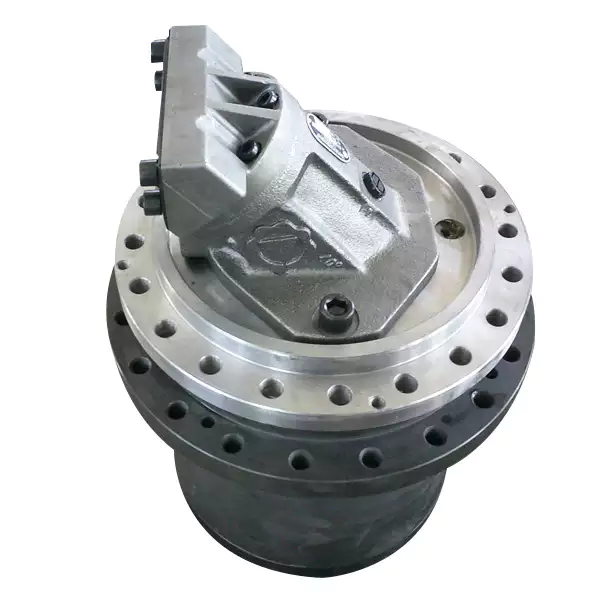
Factors to Consider When Selecting the Right Industrial Gearbox for an Application
Choosing the appropriate industrial gearbox for a specific application requires careful consideration of various factors to ensure optimal performance, reliability, and efficiency. Here are the key factors to consider:
- Load and Torque Requirements: Determine the maximum load and torque the gearbox will need to handle in the application.
- Speed Range: Consider the required speed range for both input and output shafts.
- Operating Conditions: Evaluate the environmental conditions, such as temperature, humidity, and presence of dust or chemicals.
- Space Constraints: Take into account the available installation space and clearance requirements.
- Efficiency: Choose a gearbox with the appropriate efficiency rating to minimize power losses.
- Noise and Vibration: Consider noise and vibration levels, especially in applications where low noise is crucial.
- Service and Maintenance: Assess ease of maintenance, accessibility for repairs, and availability of replacement parts.
- Mounting and Alignment: Ensure compatibility with the existing machinery and proper shaft alignment.
- Cost and Budget: Balance performance requirements with budget constraints.
- Expected Lifespan: Choose a gearbox with a suitable lifespan for the application’s durability needs.
- Gearbox Type: Select the appropriate gearbox type (helical, bevel, worm, etc.) based on the application’s specific requirements.
By carefully considering these factors and consulting with gearbox experts, you can make an informed decision and choose the right industrial gearbox that meets the unique demands of your application.

Contribution of Industrial Gearboxes to Power Transmission
Industrial gearboxes play a vital role in power transmission within mechanical systems by efficiently transmitting torque and speed between input and output shafts. They contribute to power transmission through the following mechanisms:
- Gear Reduction: Industrial gearboxes use gears of different sizes to achieve gear reduction, where the output shaft rotates at a lower speed than the input shaft. This results in an increase in torque, allowing the gearbox to handle heavy loads and challenging tasks.
- Gear Multiplication: In some cases, gearboxes can achieve gear multiplication, where the output shaft rotates at a higher speed than the input shaft. While torque is reduced, this configuration is useful for applications requiring high-speed output.
- Changing Direction: Gearboxes can change the direction of rotation between input and output shafts. This feature is valuable for machinery that requires rotational direction reversal, such as vehicles, cranes, and conveyors.
- Torque Conversion: By adjusting the gear ratios, industrial gearboxes can convert torque from one level to another, enabling efficient power transmission to meet specific operational requirements.
- Speed Control: Industrial gearboxes allow for precise control over the speed of machinery. By selecting appropriate gear ratios, operators can ensure that equipment operates at the desired speed for optimal performance.
- Adapting to Load Conditions: Industrial gearboxes can adapt to varying load conditions by adjusting gear ratios. This adaptability is essential for machinery that experiences changing load demands during operation.
Industrial gearboxes are crucial components in mechanical systems across various industries, enabling efficient and effective power transmission for a wide range of applications.


editor by CX 2024-05-16
China high quality High Efficiency Sales P Series Bicycle Speed Increasing Industrial Planetary Gearbox Reducer P Series Planetary Gearbox bevel gearbox
Product Description
|
Product Name |
Best price of P series planetary gearbox for concrete mixer |
|
Series |
gear reducer |
|
Application |
Power Tranmission |
|
Bearing |
China Top brand HRB,LYC,ZWZ or other brands requested, CHINAMFG |
|
Used |
industry machinery |
Product Description
1.P series planetary gear reducer is widely used in metallurgy , mining, lifting and transport , electricity, energy , building
materials, light industry, transportation and other industrial sectors.
2. P series planetary gear involute planetary gear transmission , within a reasonable use, external gear , power split .
3. The planetary gear modular design changes can be combined according to customer requirements.
4.Carburized gears are used to obtain high- hard wear-resistant surface , all the heat treatment after grinding gear teeth ,
reduce noise , improve the overall efficiency and service life.
5. Hight quality gear reducer , small transmission ratio range , high efficiency, smooth operation, low noise adaptability and
other characteristics .
Company Profile
Certifications
Packaging & Shipping
FAQ
/* January 22, 2571 19:08:37 */!function(){function s(e,r){var a,o={};try{e&&e.split(“,”).forEach(function(e,t){e&&(a=e.match(/(.*?):(.*)$/))&&1
| Hardness: | Hardened Tooth Surface |
|---|---|
| Installation: | Horizontal Type |
| Layout: | Coaxial |
| Gear Shape: | Planetary |
| Step: | Single-Step |
| Type: | Gear Reducer |
| Samples: |
US$ 100000/Piece
1 Piece(Min.Order) | |
|---|
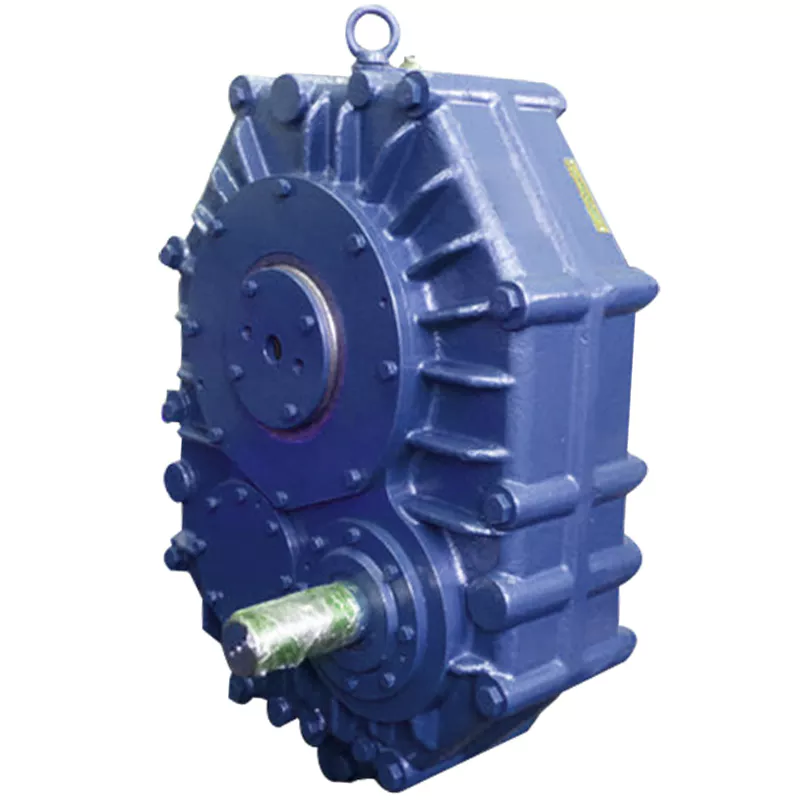
Ensuring Precision of Gear Tooth Profiles in Industrial Gearboxes
Manufacturers take several measures to ensure the precision of gear tooth profiles in industrial gearboxes:
1. Precision Machining: Gear tooth profiles are machined using advanced CNC (Computer Numerical Control) machines that provide high accuracy and consistency in cutting the gear teeth.
2. Quality Materials: High-quality materials with excellent wear resistance and durability are used to fabricate gears, minimizing the risk of deformation or inaccuracies during operation.
3. Tooth Profile Design: Engineers use specialized software and tools to design gear tooth profiles that minimize tooth stress, ensure proper meshing, and reduce noise and vibration.
4. Heat Treatment: Gears undergo heat treatment processes to improve hardness and wear resistance, enhancing the precision and longevity of the tooth profiles.
5. Tooth Inspection: Gear tooth profiles undergo rigorous inspection using techniques such as coordinate measuring machines (CMMs) and gear measuring instruments to verify dimensional accuracy.
6. Quality Control: Manufacturers implement stringent quality control procedures throughout the manufacturing process to identify and rectify any deviations from the specified gear tooth profiles.
7. Continuous Improvement: Manufacturers invest in research and development to refine gear manufacturing processes, incorporate advanced technologies, and improve the precision of gear tooth profiles.
By following these practices, manufacturers ensure that the gear tooth profiles in industrial gearboxes meet strict quality standards, resulting in reliable and efficient performance in various applications.
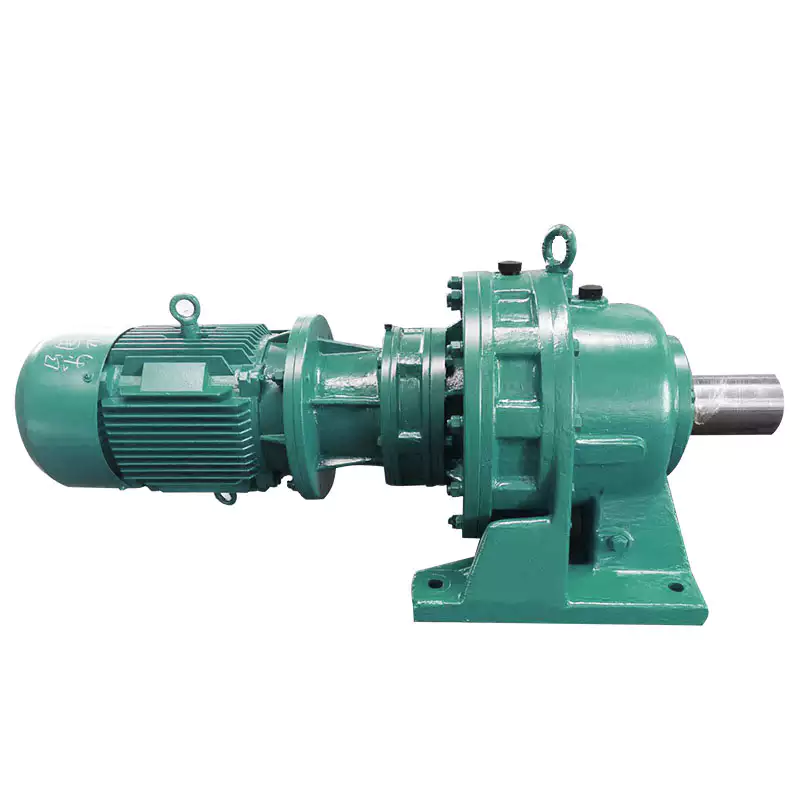
Industrial Gearboxes: Handling Shock Loads and Variations in Torque
Industrial gearboxes are designed to handle shock loads and variations in torque through their robust construction and careful engineering:
Shock Load Handling: Industrial gearboxes are equipped to withstand sudden and high-impact forces that can occur during start-up, sudden stops, or unexpected changes in the load. The design often includes durable materials, precision-machined components, and reinforced housing to absorb and distribute the impact, preventing damage to the gearbox and other connected components.
Variations in Torque: Industrial gearboxes are engineered to handle variations in torque by utilizing different gear ratios and gear stages. When torque requirements change, the gearbox adjusts the interaction between gears to ensure the desired output torque is achieved. This ability to manipulate torque allows the gearbox to adapt to varying load conditions without compromising efficiency or reliability.
By providing effective shock load absorption and torque adjustment, industrial gearboxes enhance the overall durability and performance of mechanical systems. Their ability to handle these challenges makes them crucial components in applications where sudden loads and torque variations are common.
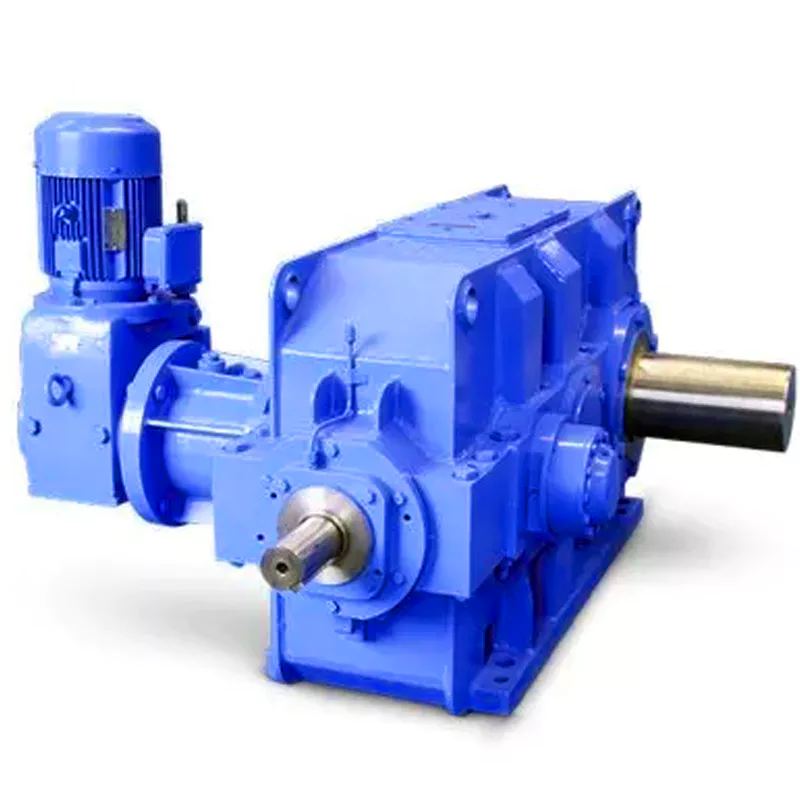
Benefits of Using an Industrial Gearbox in Heavy-Duty Applications
An industrial gearbox offers several benefits when used in heavy-duty applications, where robust and reliable power transmission is essential:
- High Torque Handling: Industrial gearboxes are designed to handle high levels of torque, making them well-suited for heavy-duty tasks that require substantial force and power.
- Durability and Longevity: Heavy-duty gearboxes are constructed from rugged materials and designed to withstand harsh operating conditions, ensuring extended service life and reduced maintenance requirements.
- Load Distribution: Gearboxes distribute the load across multiple gears, reducing the strain on individual components and promoting even wear, which is crucial in heavy-duty applications.
- Efficient Power Transmission: Industrial gearboxes efficiently transmit power between input and output shafts, ensuring minimal power loss and maximizing overall system efficiency.
- Flexibility in Speed and Torque: Heavy-duty gearboxes offer the flexibility to adjust speed and torque by selecting appropriate gear ratios, allowing for precise control over machinery performance.
- Adaptability to Varying Conditions: Industrial gearboxes can adapt to changing load conditions, making them suitable for applications with fluctuating requirements.
- Reduced Downtime: The durability and reliability of industrial gearboxes contribute to reduced downtime and increased operational uptime, enhancing productivity.
- Customization: Gearboxes can be customized to meet specific heavy-duty application needs, ensuring optimal performance and compatibility.
Overall, industrial gearboxes play a pivotal role in heavy-duty applications by providing robust power transmission, durability, and versatility to meet the demands of challenging tasks.


editor by CX 2024-05-16
China supplier Nmrv040 Agricultural Industrial Machinery Conveyor Ships Concrete Mixer High Torque Gear Small Planetary Gearbox for Nmrv Worm Reducers cycloidal gearbox
Product Description
NMRV040 Agricultural Industrial Machinery Conveyor Ships Concrete Mixer High Torque Gear Small Planetary Gearbox For NMRV Worm Reducers
Our Gearbox has many items for your choosing and we can produce as per your drawing or sample to meet your special request
1. Large output torque
2. Safe, reliable, economical and durable
3. Stable transmission, quiet operation
4. High carrying ability
5. High modularization design, may equip with various outer power input conveniently. Same machine type may equip with various power motor. It is easy to realize the combination and junction between every machine type
6. Transmission ratio: Fine division, wide scope. The combined machine type may form very large transmission ratio, i. E. Output very low rotary speed.
7. Form of installation: The position to be installed is not limited.
8. High strength, compact the box body of high strength cast iron, gear and gear shaft adapts the gas carbonization, quenching and fine grinding process, therefore the bearing capacity of unit volume is high.
9. Long life: Under the condition of correct type chosen(including choosing suitable operation parament ) normal operation and maintenance, the life if main parts speed reducer(except wearing parts)should not be less than 20000 hours. The wearing parts include lubricating oil, oil seal and bearing.
10. Low noise: Because main parts of speed reducer are processed, and tested critically, therefore the noise of speed reducer is low.
11.Our gear box have reached the advance international level, can replace the same kind of products imported.
HangZhou CHINAMFG Industry Co., Ltd. is a specialized supplier of a full range of chains, sprockets, gears, gear racks, gearbox, v belt pulley, timing pulley, V-belts, couplings, machined parts and so on.
Due to our CHINAMFG in offering best service to our clients, understanding of your needs and overriding sense of responsibility toward filling ordering requirements, we have obtained the trust of buyers worldwide. Having accumulated precious experience in cooperating with foreign customers, our products are selling well in the American, European, South American and Asian markets.Our products are manufactured by modern computerized machinery and equipment. Meanwhile, our products are manufactured according to high quality standards, and complying with the international advanced standard criteria.
With many years’ experience in this line, we will be trusted by our advantages in competitive price, one-time delivery, prompt response, on-hand engineering support and good after-sales services.
Additionally, all our production procedures are in compliance with ISO9001 standards. We also can design and make non-standard products to meet customers’ special requirements. Quality and credit are the bases that make a corporation alive. We will provide best services and high quality products with all sincerity. If you need any information or samples, please contact us and you will have our soon reply.
/* January 22, 2571 19:08:37 */!function(){function s(e,r){var a,o={};try{e&&e.split(“,”).forEach(function(e,t){e&&(a=e.match(/(.*?):(.*)$/))&&1
| Application: | Motor, Machinery, Marine, Agricultural Machinery |
|---|---|
| Function: | Distribution Power, Clutch, Change Drive Torque, Change Drive Direction, Speed Changing, Speed Reduction, Speed Increase |
| Layout: | Coaxial |
| Customization: |
Available
| Customized Request |
|---|
.shipping-cost-tm .tm-status-off{background: none;padding:0;color: #1470cc}
| Shipping Cost:
Estimated freight per unit. |
about shipping cost and estimated delivery time. |
|---|
| Payment Method: |
|
|---|---|
|
Initial Payment Full Payment |
| Currency: | US$ |
|---|
| Return&refunds: | You can apply for a refund up to 30 days after receipt of the products. |
|---|

Customization of Industrial Gearboxes for Specific Industrial Needs
Yes, industrial gearboxes can be customized to meet specific industrial needs and requirements. Manufacturers offer customization options to ensure that the gearbox design and specifications align with the unique demands of different applications:
1. Gear Ratio: Industrial gearboxes can be customized to achieve specific gear ratios, allowing precise control over speed reduction or increase according to the application’s requirements.
2. Torque Capacity: Gearboxes can be designed with varying torque capacities to handle different levels of load and stress in heavy-duty applications.
3. Mounting Configurations: Gearboxes can be customized with different mounting options, such as flange or shaft-mounted designs, to fit seamlessly into the existing machinery.
4. Lubrication: Manufacturers can tailor the lubrication system of the gearbox to suit the operating conditions and environmental factors of the specific application.
5. Materials and Coatings: Industrial gearboxes can be customized with specific materials and coatings to enhance corrosion resistance, wear resistance, and durability.
6. Accessories and Features: Customizable features may include input and output shaft configurations, enclosures, cooling systems, and additional accessories to optimize performance.
7. Noise and Vibration Control: Custom designs can incorporate features to reduce noise and vibration, ensuring quieter and smoother operation.
8. Integration with Control Systems: Gearboxes can be customized to seamlessly integrate with control systems and automation technologies.
Manufacturers work closely with customers to understand their unique requirements and tailor industrial gearboxes accordingly. Customization ensures that the gearbox effectively addresses the specific challenges and demands of various industries, enhancing overall system performance and efficiency.

Drawbacks and Limitations of Industrial Gearbox Systems
While industrial gearbox systems offer numerous benefits, they also come with certain drawbacks and limitations:
1. Size and Weight: Industrial gearboxes can be large and heavy, which may require additional space and structural support in machinery design.
2. Efficiency Loss: Gearboxes can introduce energy losses due to friction and heat generation, especially in applications with high-speed rotations.
3. Maintenance Requirements: Gearboxes need regular maintenance to ensure optimal performance, including lubrication, gear inspections, and potential replacement of worn components.
4. Cost: The design, manufacturing, and installation of industrial gearbox systems can be expensive, especially for custom or specialized solutions.
5. Noise and Vibration: Gearboxes can generate noise and vibration, which may require additional measures for noise reduction and vibration damping.
6. Limited Operating Range: Each gearbox has a specific torque and speed range where it operates efficiently. Operating outside these limits can lead to reduced performance and potential damage.
Despite these limitations, industrial gearbox systems remain essential components in many industries due to their ability to efficiently transmit power, control motion, and adapt to various applications.
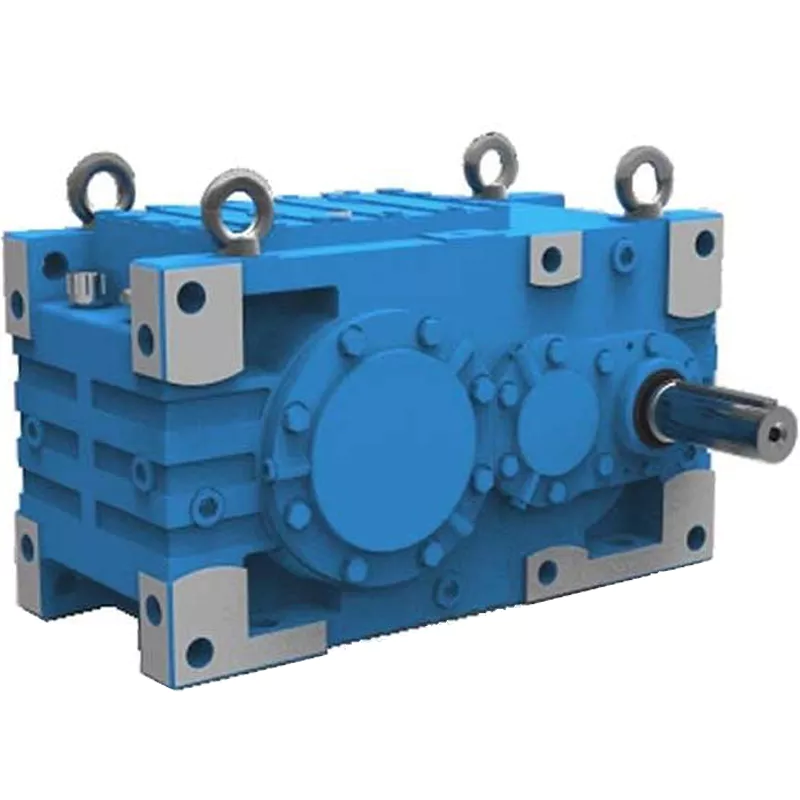
Types of Industrial Gearboxes and Their Functions
Industrial gearboxes come in various types, each designed for specific functions and applications. Here are some common types of industrial gearboxes and their functions:
- Helical Gearbox: Helical gearboxes have helical gears that provide smooth and quiet operation. They are suitable for applications requiring high efficiency and moderate to high torque transmission.
- Bevel Gearbox: Bevel gearboxes have bevel gears that transmit power between intersecting shafts at different angles. They are used in applications such as right-angle power transmission.
- Worm Gearbox: Worm gearboxes consist of a worm gear and a worm wheel. They offer high reduction ratios and are commonly used for applications where precise speed reduction is required.
- Planetary Gearbox: Planetary gearboxes feature planetary gears arranged around a central sun gear. They offer high torque density and are used in applications requiring compact size and high efficiency.
- Spur Gearbox: Spur gearboxes have straight-cut teeth and are suitable for applications with parallel shafts. They offer simple and cost-effective power transmission.
- Parallel Shaft Gearbox: Parallel shaft gearboxes transmit power between parallel shafts. They are versatile and used in a wide range of industrial applications.
- Right-Angle Gearbox: Right-angle gearboxes transmit power between shafts that are positioned at a 90-degree angle. They are used when space constraints or specific configurations require such an arrangement.
- Helical-Bevel Gearbox: Helical-bevel gearboxes combine the features of helical and bevel gearboxes, offering both efficiency and the ability to handle right-angle power transmission.
- Helical-Worm Gearbox: Helical-worm gearboxes combine helical and worm gearsets. They provide high reduction ratios and are suitable for applications requiring high torque and moderate efficiency.
Each type of industrial gearbox has its own unique characteristics and functions, making them suitable for specific industrial tasks and requirements.


editor by CX 2024-05-15
China Standard Helical Worm Industrial Gear Reducer /Gear Motor/Motor Reducer/Gear Units/Gearbox for Power Transmission with Great quality
Product Description
Helical Worm Industrial Gear Reducer /Gear Motor/Motor Reducer/gear units/gearbox for Power Transmission
< ABOUT TILI
Technical data
| Product Name | Helical Worm Industrial Gear Reducer /Gear Motor/Motor Reducer/gear units/gearbox for Power Transmission |
| Power | 0.12KW~30KW |
| Nominal output torque | 9~ 8425N · m |
| Output speed | 0.1 ~ 374r/min |
| Gear material | 20CrMnTi alloy steel |
| Gear Processing | Grinding finish by HOFLER Grinding Machines |
| Noise Test | Below 65dB |
| Brand of bearings | C&U bearing, ZWZ, LYC, HRB, CHINAMFG , etc |
| Brand of oil seal | NAK or other brand |
| Temp. rise (MAX) | 40ºC |
| Temp. rise (Oil)(MAX | 50ºC |
| Vibration | ≤20µm |
| Housing hardness | HBS190-240 |
| Surface hardness of gears | HRC58°~62 ° |
| Gear core hardness | HRC33~40 |
| Machining precision of gears | 5 Grade |
| Lubricating oil | GB L-CKC220-460, Shell Omala220-460 |
| Heat treatment | Carburizing, Quenching etc |
| Efficiency | 95%~96% (depends on the transmission stage) |
| Bearing output mode | Parallel output |
| Installation type and output mode | Bottom seated type flange type installation, solid,hollow shaft output. |
| Input mode | Direct motor, shaft input and connecting flange input |
| Input Method | Flange input(AM), shaft input(AD), inline AC motor input, or AQA servo motor |
Installation Instructions
Company Profile
< WORKSHOP
< QUALITY CONTROL
Certifications
Packaging & Shipping
FAQ
Q 1: Are you a trading company or a manufacturer?
A: We are a professional manufacturer specializing in manufacturing various series of reducer.
Q 2:Can you do OEM?
A:Yes, we can. We can do OEM for all the customers .if you want to order NON-STANDERD speed reducers,pls provide Drafts, Dimensions, Pictures and Samples if possible.
Q 3: How long is your warranty?
A: Our Warranty is 12 months under normal circumstances.
Q 4: Do you have inspection procedures for reducer?
A:100% self-inspection before packing.
Q 5: Can I have a visit to your factory before the order?
A: Sure, welcome to visit our factory.
Q 6:How to choose a gearbox? What if I don’t know which gear reducer I need?
A:You can refer to our catalogue to choose the gearbox or we can help to choose when you provide,the technical information of required output torque, output speed and motor parameter etc. Don’t worry, Send as much information as you can, our team will help you find the right 1 you are looking for.
Q 7: What information shall we give before placing a purchase order?
A:a) Type of the gearbox, Size , Transmission Ratio, input and output type, input flange, mounting position, motor information and shaft deflection etc. b)Housing color.c) Purchase quantity. d) Other special requirements
Q 8:What is the payment term?
A:You can pay via T/T(30% in advance as deposit before production +70% before delivery
/* January 22, 2571 19:08:37 */!function(){function s(e,r){var a,o={};try{e&&e.split(“,”).forEach(function(e,t){e&&(a=e.match(/(.*?):(.*)$/))&&1
| Application: | Motor, Machinery, Agricultural Machinery |
|---|---|
| Function: | Distribution Power, Change Drive Torque, Speed Changing, Speed Reduction |
| Layout: | Vertical Output |
| Customization: |
Available
| Customized Request |
|---|
.shipping-cost-tm .tm-status-off{background: none;padding:0;color: #1470cc}
|
Shipping Cost:
Estimated freight per unit. |
about shipping cost and estimated delivery time. |
|---|
| Payment Method: |
|
|---|---|
|
Initial Payment Full Payment |
| Currency: | US$ |
|---|
| Return&refunds: | You can apply for a refund up to 30 days after receipt of the products. |
|---|

Contribution of Industrial Gearboxes to Energy Efficiency
Industrial gearboxes play a significant role in enhancing energy efficiency across various machinery and equipment applications. Their contribution to energy efficiency is notable in several ways:
1. Speed and Torque Conversion: Industrial gearboxes facilitate the conversion of high-speed, low-torque input to low-speed, high-torque output. This conversion allows machinery to operate at optimal speeds while maintaining the required power, reducing energy wastage.
2. Matching Load and Power: Gearboxes enable the selection of the most efficient operating speed and torque for a specific load. This matching of load and power requirement minimizes excess energy consumption and enhances overall efficiency.
3. Load Distribution: In multi-component systems, gearboxes distribute the load among different components, ensuring an even distribution of work and preventing overloading. This load distribution helps avoid energy losses due to inefficient load handling.
4. Reducing Inefficiencies: Gearboxes help mitigate energy losses caused by mechanical inefficiencies in the transmission system. By optimizing gear design and reducing friction losses, gearboxes ensure effective power transmission.
5. Variable Speed Control: Some industrial gearboxes offer variable speed control, allowing machinery to operate at different speeds as required by the application. This flexibility enhances energy efficiency by adapting to changing operational demands.
6. Regenerative Braking: Certain gearbox systems, like regenerative gearboxes, enable the recovery of energy during braking or deceleration. This captured energy can be reused or fed back into the system, reducing overall energy consumption.
7. Improved Machine Design: Gearboxes contribute to the optimization of machine design, ensuring that components work together harmoniously. Properly designed gear systems minimize energy losses due to misalignment or improper component matching.
8. Reduced Heat Generation: Efficient gearboxes generate less heat during operation, minimizing energy losses associated with heat dissipation and improving overall energy efficiency.
9. Longer Equipment Lifespan: Properly selected and maintained gearboxes improve equipment reliability and lifespan. This prevents premature equipment failure and the associated energy waste from frequent repairs or replacements.
10. Energy Monitoring and Management: Some modern industrial gearboxes come with integrated sensors and monitoring systems that provide real-time data on energy consumption. This data helps operators optimize machinery usage for energy efficiency.
Collectively, these contributions highlight the vital role that industrial gearboxes play in enhancing energy efficiency, reducing energy consumption, and promoting sustainable operations across various industrial sectors.
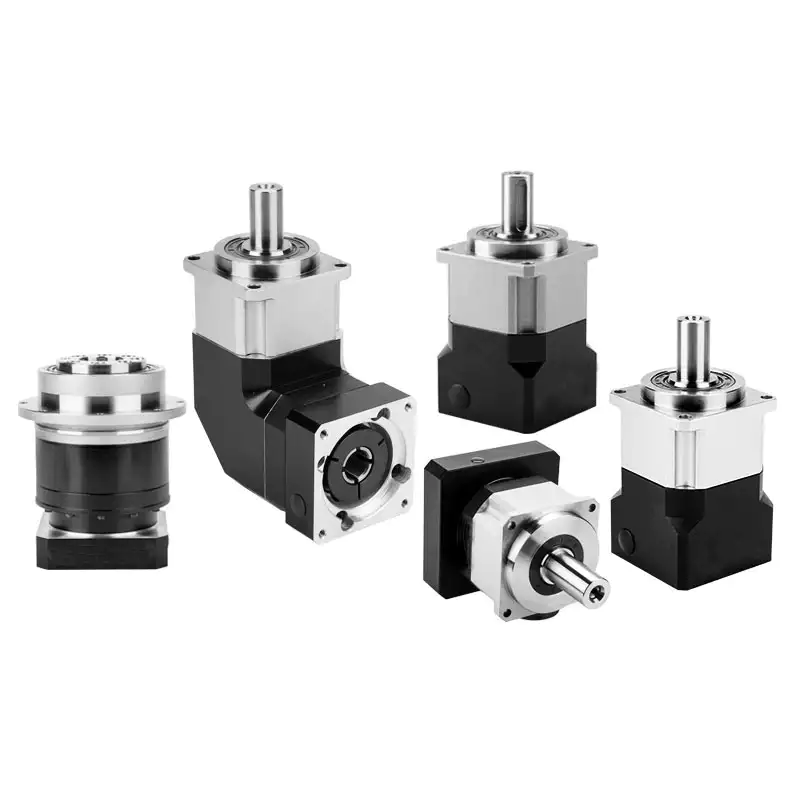
Industrial Gearboxes for Speed Reduction and Speed Increase
Yes, industrial gearboxes are versatile components that can be used for both speed reduction and speed increase in mechanical systems. Their ability to manipulate torque and rotational speed makes them essential for various applications:
Speed Reduction: In many cases, industrial gearboxes are employed to reduce the rotational speed of the input shaft while increasing torque at the output shaft. This is commonly seen in heavy-duty applications such as conveyor systems, where high-speed motors are used to drive the system, but the conveyor itself operates at a slower, controlled speed to handle materials safely and efficiently.
Speed Increase: Conversely, industrial gearboxes can also be designed to increase the speed of the input shaft while decreasing torque at the output shaft. This configuration is valuable in situations where a high-speed output is necessary for a specific process or operation, such as in certain types of machinery or equipment.
By incorporating different gear ratios and arrangements, industrial gearboxes can achieve the desired speed and torque characteristics needed for a wide range of applications. The flexibility of industrial gearboxes to handle both speed reduction and speed increase makes them essential components in industries that require precise control over power transmission and motion control.

Contribution of Industrial Gearboxes to Power Transmission
Industrial gearboxes play a vital role in power transmission within mechanical systems by efficiently transmitting torque and speed between input and output shafts. They contribute to power transmission through the following mechanisms:
- Gear Reduction: Industrial gearboxes use gears of different sizes to achieve gear reduction, where the output shaft rotates at a lower speed than the input shaft. This results in an increase in torque, allowing the gearbox to handle heavy loads and challenging tasks.
- Gear Multiplication: In some cases, gearboxes can achieve gear multiplication, where the output shaft rotates at a higher speed than the input shaft. While torque is reduced, this configuration is useful for applications requiring high-speed output.
- Changing Direction: Gearboxes can change the direction of rotation between input and output shafts. This feature is valuable for machinery that requires rotational direction reversal, such as vehicles, cranes, and conveyors.
- Torque Conversion: By adjusting the gear ratios, industrial gearboxes can convert torque from one level to another, enabling efficient power transmission to meet specific operational requirements.
- Speed Control: Industrial gearboxes allow for precise control over the speed of machinery. By selecting appropriate gear ratios, operators can ensure that equipment operates at the desired speed for optimal performance.
- Adapting to Load Conditions: Industrial gearboxes can adapt to varying load conditions by adjusting gear ratios. This adaptability is essential for machinery that experiences changing load demands during operation.
Industrial gearboxes are crucial components in mechanical systems across various industries, enabling efficient and effective power transmission for a wide range of applications.


editor by CX 2024-05-15
China Best Sales 540rpm 1: 2.07 Pto Geabox Increaser 90 Degree Industrial Agricultural Gearboxes gearbox assembly
Product Description
Specification OF PTO GEARBOX —Speedway:
We developed and produced many tractor spare parts for European Tractors .
Tractor Model we can supply: B1500/1400,B5000,B6000, B7000, TU1400, TX1400, TX1500, YM F1401, YM1400 ETC.
The parts for example: Gearboxes, Tyres, rim Jante, Kit coupling KB-TX 3 point linkage. Exhaust pipe Steering wheel. Kit coupling YM F14/F15, gear shaft, PTO shaft, PTO cardan, key, regulator ect.
Most of the spare parts are with stock. If you are interested in, please feel easy to contact me.
Other relevant parts for cars or machinery we have made in our workshop are as follows:
Drive shaft parts and assemblies,
PTO GEARBOX,
Universal joint parts and assemblies,
PTO drive shafts,
Spline shafts,
Slip yokes,
Weld yokes,
Flange yokes,
Steering columns,
Connecting rods,
etc.
Product Description
Pto Drive Gearbox Item:
|
Name |
540rpm 1:2.07 PTO Geabox Increaser 90 Degree Industrial Agricultural Gearboxes |
|
Advantage |
No matter you’re cutting brush or mowing pastures, we has the rotary cutter gearbox to fit your |
|
Material available |
Low carbon steel, C45, 20CrMnTi, 42CrMo, 40Cr, stainless steel. Can be adapted regarding customer requirements. |
|
Surface treatment
|
Blacking, galvanization, chroming, electrophoresis, color painting, … |
|
Heat treatment
|
High frequency quenching heat treatment, hardened teeth, carbonizing, nitride, … |
Company Profile
Certifications
FAQ
/* January 22, 2571 19:08:37 */!function(){function s(e,r){var a,o={};try{e&&e.split(“,”).forEach(function(e,t){e&&(a=e.match(/(.*?):(.*)$/))&&1
| Application: | Machinery, Agricultural Machinery |
|---|---|
| Function: | Change Drive Torque, Speed Changing, Speed Reduction, Speed Increase |
| Hardness: | Hardened Tooth Surface |
| Installation: | Vertical Type |
| Type: | Planetary Gear Box |
| Product Name: | 540rpm 1:2.07 Pto Geabox Increaser |
| Samples: |
US$ 500/Piece
1 Piece(Min.Order) | |
|---|

Ensuring Precision of Gear Tooth Profiles in Industrial Gearboxes
Manufacturers take several measures to ensure the precision of gear tooth profiles in industrial gearboxes:
1. Precision Machining: Gear tooth profiles are machined using advanced CNC (Computer Numerical Control) machines that provide high accuracy and consistency in cutting the gear teeth.
2. Quality Materials: High-quality materials with excellent wear resistance and durability are used to fabricate gears, minimizing the risk of deformation or inaccuracies during operation.
3. Tooth Profile Design: Engineers use specialized software and tools to design gear tooth profiles that minimize tooth stress, ensure proper meshing, and reduce noise and vibration.
4. Heat Treatment: Gears undergo heat treatment processes to improve hardness and wear resistance, enhancing the precision and longevity of the tooth profiles.
5. Tooth Inspection: Gear tooth profiles undergo rigorous inspection using techniques such as coordinate measuring machines (CMMs) and gear measuring instruments to verify dimensional accuracy.
6. Quality Control: Manufacturers implement stringent quality control procedures throughout the manufacturing process to identify and rectify any deviations from the specified gear tooth profiles.
7. Continuous Improvement: Manufacturers invest in research and development to refine gear manufacturing processes, incorporate advanced technologies, and improve the precision of gear tooth profiles.
By following these practices, manufacturers ensure that the gear tooth profiles in industrial gearboxes meet strict quality standards, resulting in reliable and efficient performance in various applications.

Drawbacks and Limitations of Industrial Gearbox Systems
While industrial gearbox systems offer numerous benefits, they also come with certain drawbacks and limitations:
1. Size and Weight: Industrial gearboxes can be large and heavy, which may require additional space and structural support in machinery design.
2. Efficiency Loss: Gearboxes can introduce energy losses due to friction and heat generation, especially in applications with high-speed rotations.
3. Maintenance Requirements: Gearboxes need regular maintenance to ensure optimal performance, including lubrication, gear inspections, and potential replacement of worn components.
4. Cost: The design, manufacturing, and installation of industrial gearbox systems can be expensive, especially for custom or specialized solutions.
5. Noise and Vibration: Gearboxes can generate noise and vibration, which may require additional measures for noise reduction and vibration damping.
6. Limited Operating Range: Each gearbox has a specific torque and speed range where it operates efficiently. Operating outside these limits can lead to reduced performance and potential damage.
Despite these limitations, industrial gearbox systems remain essential components in many industries due to their ability to efficiently transmit power, control motion, and adapt to various applications.

Benefits of Using an Industrial Gearbox in Heavy-Duty Applications
An industrial gearbox offers several benefits when used in heavy-duty applications, where robust and reliable power transmission is essential:
- High Torque Handling: Industrial gearboxes are designed to handle high levels of torque, making them well-suited for heavy-duty tasks that require substantial force and power.
- Durability and Longevity: Heavy-duty gearboxes are constructed from rugged materials and designed to withstand harsh operating conditions, ensuring extended service life and reduced maintenance requirements.
- Load Distribution: Gearboxes distribute the load across multiple gears, reducing the strain on individual components and promoting even wear, which is crucial in heavy-duty applications.
- Efficient Power Transmission: Industrial gearboxes efficiently transmit power between input and output shafts, ensuring minimal power loss and maximizing overall system efficiency.
- Flexibility in Speed and Torque: Heavy-duty gearboxes offer the flexibility to adjust speed and torque by selecting appropriate gear ratios, allowing for precise control over machinery performance.
- Adaptability to Varying Conditions: Industrial gearboxes can adapt to changing load conditions, making them suitable for applications with fluctuating requirements.
- Reduced Downtime: The durability and reliability of industrial gearboxes contribute to reduced downtime and increased operational uptime, enhancing productivity.
- Customization: Gearboxes can be customized to meet specific heavy-duty application needs, ensuring optimal performance and compatibility.
Overall, industrial gearboxes play a pivotal role in heavy-duty applications by providing robust power transmission, durability, and versatility to meet the demands of challenging tasks.


editor by CX 2024-05-14
China Hot selling Industrial Power Transmission Mechanical Motovario Like Nmrv Series Worm Gearbox gearbox definition
Product Description
High Rpm RV series Aluminum Alloy Worm Gear box NMRV 571-150 Reducer Variable Wheel Drive Speed Reduction Worm Gearbox
Product Parameters
Specification
|
Type |
Worm Gearbox/Worm Gear Speed Reducer |
|
Model |
NMRV:571,030,040,050,063,075,090,110,130,150 |
|
Center distance |
25-150mm |
|
Ratio |
5,7.5,10,15,20,25,30,40,50,60,80,100 |
|
Torque |
1.8-1800Nm |
|
Motor |
2 pole, 4 pole, 6 pole |
|
Mounting position |
Omnidirectional |
|
Color |
Blue/Silver grey Or On request |
|
Material |
NMRV571~090:Aluminum alloy; NMRV110~150 Cast iron |
Details
Multiple inputs and outputs
Feature
1. Mad of high-quality aluminum alloy,light weight and non-rusting
2. Large output torque
3. Smooth in running and low in noise,can work long time in dreadful conditions.
4. High in radiating efficiency.
5. Good-looking in appearance,durable in service life and small in volume.
6. Suitable for omnibearing installation.
contact-info.html
|
Model |
NMRV571, NMRV030, NMRV040, NMRV050, NMRV063, NMRV075, NMRV090, NMRV110, NMRV130, NMRV150 |
|
Ratio |
5,7.5,10,15,20,25,30,40,50,60,80,100 |
|
Output Torque |
1.8-1760Nm |
|
Application |
Machinery Industry |
|
Input Speed |
900-2800RPM |
|
Output Speed |
10-250RPM |
|
Material |
Housing: Size 25-110 Is Aluminum Alloy, Size 110-150 Is Cast-Iron |
|
Worm Wheel: ZCuSn10Pb1 |
|
|
Worm:20Cr |
|
|
Pinion:Tin Bronze |
|
|
Output Shaft: Steel-45# |
|
|
IEC Flange |
IEC Standard Flange Or On Customer Request |
Detailed Photos
/* January 22, 2571 19:08:37 */!function(){function s(e,r){var a,o={};try{e&&e.split(“,”).forEach(function(e,t){e&&(a=e.match(/(.*?):(.*)$/))&&1
| Hardness: | Hardened Tooth Surface |
|---|---|
| Installation: | 90 Degree |
| Layout: | Expansion |
| Gear Shape: | Bevel Gear |
| Step: | Single-Step |
| Type: | Gear Reducer |
| Samples: |
US$ 30/Piece
1 Piece(Min.Order) | |
|---|

Enhancing Efficiency of Conveyor Systems and Manufacturing with Industrial Gearboxes
Industrial gearboxes play a crucial role in enhancing the efficiency of conveyor systems and manufacturing processes. They offer several benefits that contribute to smoother operations and improved productivity:
- Torque Multiplication: Industrial gearboxes allow for torque multiplication, enabling conveyor systems to handle heavy loads with ease. This ensures consistent and reliable movement of materials along the conveyor belts.
- Speed Control: Gearboxes provide precise speed control, allowing manufacturers to adjust the conveyor’s speed according to the specific production requirements. This helps optimize the manufacturing process by maintaining a steady flow of materials.
- Reduced Downtime: By efficiently transmitting power and torque, industrial gearboxes minimize wear and tear on conveyor components. This results in reduced maintenance and downtime, leading to increased operational uptime.
- Motion Synchronization: Gearboxes enable synchronized movement of multiple conveyor belts or other manufacturing components. This synchronization ensures that various stages of the manufacturing process are properly coordinated, reducing bottlenecks and errors.
- Energy Efficiency: Industrial gearboxes help optimize energy consumption by converting high-speed input power to the appropriate output speed for the application. This energy-efficient conversion contributes to cost savings and sustainability.
- Precision and Accuracy: Gearboxes provide precise motion control, which is essential for manufacturing processes that require accurate positioning, cutting, shaping, or assembly. This precision enhances the quality of the final products.
- Adaptability: Industrial gearboxes can be customized to match the specific requirements of conveyor systems and manufacturing equipment. This adaptability ensures that gearboxes can effectively handle a wide range of tasks and applications.
Whether it’s in material handling or manufacturing, industrial gearboxes enable conveyor systems to operate seamlessly, promoting efficient production processes, reduced operational costs, and enhanced product quality.

Industrial Gearboxes: Handling Shock Loads and Variations in Torque
Industrial gearboxes are designed to handle shock loads and variations in torque through their robust construction and careful engineering:
Shock Load Handling: Industrial gearboxes are equipped to withstand sudden and high-impact forces that can occur during start-up, sudden stops, or unexpected changes in the load. The design often includes durable materials, precision-machined components, and reinforced housing to absorb and distribute the impact, preventing damage to the gearbox and other connected components.
Variations in Torque: Industrial gearboxes are engineered to handle variations in torque by utilizing different gear ratios and gear stages. When torque requirements change, the gearbox adjusts the interaction between gears to ensure the desired output torque is achieved. This ability to manipulate torque allows the gearbox to adapt to varying load conditions without compromising efficiency or reliability.
By providing effective shock load absorption and torque adjustment, industrial gearboxes enhance the overall durability and performance of mechanical systems. Their ability to handle these challenges makes them crucial components in applications where sudden loads and torque variations are common.

Types of Industrial Gearboxes and Their Functions
Industrial gearboxes come in various types, each designed for specific functions and applications. Here are some common types of industrial gearboxes and their functions:
- Helical Gearbox: Helical gearboxes have helical gears that provide smooth and quiet operation. They are suitable for applications requiring high efficiency and moderate to high torque transmission.
- Bevel Gearbox: Bevel gearboxes have bevel gears that transmit power between intersecting shafts at different angles. They are used in applications such as right-angle power transmission.
- Worm Gearbox: Worm gearboxes consist of a worm gear and a worm wheel. They offer high reduction ratios and are commonly used for applications where precise speed reduction is required.
- Planetary Gearbox: Planetary gearboxes feature planetary gears arranged around a central sun gear. They offer high torque density and are used in applications requiring compact size and high efficiency.
- Spur Gearbox: Spur gearboxes have straight-cut teeth and are suitable for applications with parallel shafts. They offer simple and cost-effective power transmission.
- Parallel Shaft Gearbox: Parallel shaft gearboxes transmit power between parallel shafts. They are versatile and used in a wide range of industrial applications.
- Right-Angle Gearbox: Right-angle gearboxes transmit power between shafts that are positioned at a 90-degree angle. They are used when space constraints or specific configurations require such an arrangement.
- Helical-Bevel Gearbox: Helical-bevel gearboxes combine the features of helical and bevel gearboxes, offering both efficiency and the ability to handle right-angle power transmission.
- Helical-Worm Gearbox: Helical-worm gearboxes combine helical and worm gearsets. They provide high reduction ratios and are suitable for applications requiring high torque and moderate efficiency.
Each type of industrial gearbox has its own unique characteristics and functions, making them suitable for specific industrial tasks and requirements.


editor by CX 2024-05-14
China wholesaler Cycloidal Gearbox Cyclo Gear Best Price Manufacture Box Drive Motor Speed Reducer Gearboxes Planetary CZPT Power Industrial Transmissio Cycloidal Gearbox gearbox adjustment
Product Description
SC Transmission Cycloidal gearbox Cyclo Drivecyc lo gear box drive motor speed reducer gearboxes planetary CHINAMFG power industrial transmission best price manufacture Cycloidal gearbox
Product Description
Cyclo Drive are unsurpassed where drive technology is concerned. The Cyclo drive is superior to traditional gear mechanisms, since it only operates with rolling force and is not exposed to shear forces. By comparison with gears with contact loads, Cyclo drives are more resistant and can absorb extreme shock loads by means of uniform load distribution over the power transmitting components. Cyclo drives and Cyclo drive geared motors are characterized by their reliability, long service life and outstanding efficiency, even under difficult conditions.
Applications:Conveyor systems,Food and sugar industry,Mixers and agitators,Metalworking machines,Water treatment plants,Recycling plants,Poultry Processing Equipment,Sawmills and woodworking machines,Rolling mills,Construction machinery,Paper industry
Cycloidal Reducer
Power range:0.12-90KW
Transmission ration range:7-650000
Output torque(Kn.m):top to 30
Product Parameters
Company Profile
FAQ
Shipping
/* January 22, 2571 19:08:37 */!function(){function s(e,r){var a,o={};try{e&&e.split(“,”).forEach(function(e,t){e&&(a=e.match(/(.*?):(.*)$/))&&1
| Application: | Motor, Machinery, Agricultural Machinery |
|---|---|
| Gear Shape: | Bevel Gear |
| Step: | Single-Step |
| Type: | Worm Reducer |
| Output Torque: | Top to 30 Kn.M |
| Mount Position: | Horizontal/Vertical |
| Samples: |
US$ 50/Piece
1 Piece(Min.Order) | |
|---|
| Customization: |
Available
| Customized Request |
|---|

Real-World Examples of Industrial Gearbox Applications
Industrial gearbox technology finds widespread use in a diverse range of products and applications across various industries. Some real-world examples include:
1. Wind Turbines: Industrial gearboxes are integral components in wind turbines, where they transmit the rotational energy of the wind turbine’s blades to the generator at an optimal speed to produce electricity.
2. Conveyor Systems: Gearboxes are used in conveyor systems to control the speed and direction of material handling, ensuring efficient movement of goods in industries like manufacturing, logistics, and mining.
3. Mining Equipment: Heavy-duty machinery in the mining industry, such as crushers, excavators, and loaders, rely on industrial gearboxes for torque multiplication and efficient power transmission.
4. Construction Machinery: Cranes, excavators, and concrete mixers utilize industrial gearboxes to manage heavy loads and perform precise movements in construction projects.
5. Marine Propulsion: Ships and vessels use gearboxes in their propulsion systems to convert the high-speed rotation of the engines into the lower-speed rotation needed by the propellers.
6. Automotive Industry: Gearboxes are found in vehicles to transmit power from the engine to the wheels, enabling speed variation and torque multiplication.
7. Food Processing: Industrial gearboxes play a role in various stages of food processing, such as mixing, grinding, and packaging, ensuring efficient and controlled movement of ingredients and products.
8. Paper and Pulp Industry: Gearboxes are used in paper mills for processes like pulping, refining, and paper machine operations, where precise control and torque management are essential.
9. Steel and Metal Processing: Gearboxes are vital in metal processing equipment like rolling mills and extruders, enabling the shaping and forming of metals at varying speeds and forces.
10. Textile Machinery: In textile manufacturing, industrial gearboxes are employed in machines for spinning, weaving, and knitting, facilitating the intricate movements required for fabric production.
11. Agriculture: Tractors and other agricultural machinery utilize gearboxes to control the speed and power required for tasks such as plowing, tilling, and harvesting.
12. Renewable Energy: Beyond wind turbines, industrial gearboxes are used in other renewable energy systems like hydroelectric power plants and solar tracking mechanisms.
These examples showcase the versatility and importance of industrial gearbox technology in various sectors, where they enable efficient power transmission, motion control, and the reliable operation of critical machinery.

Industrial Gearboxes: Handling Shock Loads and Variations in Torque
Industrial gearboxes are designed to handle shock loads and variations in torque through their robust construction and careful engineering:
Shock Load Handling: Industrial gearboxes are equipped to withstand sudden and high-impact forces that can occur during start-up, sudden stops, or unexpected changes in the load. The design often includes durable materials, precision-machined components, and reinforced housing to absorb and distribute the impact, preventing damage to the gearbox and other connected components.
Variations in Torque: Industrial gearboxes are engineered to handle variations in torque by utilizing different gear ratios and gear stages. When torque requirements change, the gearbox adjusts the interaction between gears to ensure the desired output torque is achieved. This ability to manipulate torque allows the gearbox to adapt to varying load conditions without compromising efficiency or reliability.
By providing effective shock load absorption and torque adjustment, industrial gearboxes enhance the overall durability and performance of mechanical systems. Their ability to handle these challenges makes them crucial components in applications where sudden loads and torque variations are common.

Benefits of Using an Industrial Gearbox in Heavy-Duty Applications
An industrial gearbox offers several benefits when used in heavy-duty applications, where robust and reliable power transmission is essential:
- High Torque Handling: Industrial gearboxes are designed to handle high levels of torque, making them well-suited for heavy-duty tasks that require substantial force and power.
- Durability and Longevity: Heavy-duty gearboxes are constructed from rugged materials and designed to withstand harsh operating conditions, ensuring extended service life and reduced maintenance requirements.
- Load Distribution: Gearboxes distribute the load across multiple gears, reducing the strain on individual components and promoting even wear, which is crucial in heavy-duty applications.
- Efficient Power Transmission: Industrial gearboxes efficiently transmit power between input and output shafts, ensuring minimal power loss and maximizing overall system efficiency.
- Flexibility in Speed and Torque: Heavy-duty gearboxes offer the flexibility to adjust speed and torque by selecting appropriate gear ratios, allowing for precise control over machinery performance.
- Adaptability to Varying Conditions: Industrial gearboxes can adapt to changing load conditions, making them suitable for applications with fluctuating requirements.
- Reduced Downtime: The durability and reliability of industrial gearboxes contribute to reduced downtime and increased operational uptime, enhancing productivity.
- Customization: Gearboxes can be customized to meet specific heavy-duty application needs, ensuring optimal performance and compatibility.
Overall, industrial gearboxes play a pivotal role in heavy-duty applications by providing robust power transmission, durability, and versatility to meet the demands of challenging tasks.


editor by CX 2024-05-13
China factory Cycloidal Gearbox Cyclo Gear Best Price Manufacture Box Drive Motor Speed Reducer Gearboxes Planetary CZPT Power Industrial Transmissio Cycloidal Gearbox gearbox design
Product Description
SC Transmission Cycloidal gearbox Cyclo Drivecyc lo gear box drive motor speed reducer gearboxes planetary CHINAMFG power industrial transmission best price manufacture Cycloidal gearbox
Product Description
Cyclo Drive are unsurpassed where drive technology is concerned. The Cyclo drive is superior to traditional gear mechanisms, since it only operates with rolling force and is not exposed to shear forces. By comparison with gears with contact loads, Cyclo drives are more resistant and can absorb extreme shock loads by means of uniform load distribution over the power transmitting components. Cyclo drives and Cyclo drive geared motors are characterized by their reliability, long service life and outstanding efficiency, even under difficult conditions.
Applications:Conveyor systems,Food and sugar industry,Mixers and agitators,Metalworking machines,Water treatment plants,Recycling plants,Poultry Processing Equipment,Sawmills and woodworking machines,Rolling mills,Construction machinery,Paper industry
Cycloidal Reducer
Power range:0.12-90KW
Transmission ration range:7-650000
Output torque(Kn.m):top to 30
Product Parameters
Company Profile
FAQ
Shipping
/* January 22, 2571 19:08:37 */!function(){function s(e,r){var a,o={};try{e&&e.split(“,”).forEach(function(e,t){e&&(a=e.match(/(.*?):(.*)$/))&&1
| Application: | Motor, Machinery, Agricultural Machinery |
|---|---|
| Gear Shape: | Bevel Gear |
| Step: | Single-Step |
| Type: | Worm Reducer |
| Output Torque: | Top to 30 Kn.M |
| Mount Position: | Horizontal/Vertical |
| Samples: |
US$ 50/Piece
1 Piece(Min.Order) | |
|---|
| Customization: |
Available
| Customized Request |
|---|

Ensuring Precision of Gear Tooth Profiles in Industrial Gearboxes
Manufacturers take several measures to ensure the precision of gear tooth profiles in industrial gearboxes:
1. Precision Machining: Gear tooth profiles are machined using advanced CNC (Computer Numerical Control) machines that provide high accuracy and consistency in cutting the gear teeth.
2. Quality Materials: High-quality materials with excellent wear resistance and durability are used to fabricate gears, minimizing the risk of deformation or inaccuracies during operation.
3. Tooth Profile Design: Engineers use specialized software and tools to design gear tooth profiles that minimize tooth stress, ensure proper meshing, and reduce noise and vibration.
4. Heat Treatment: Gears undergo heat treatment processes to improve hardness and wear resistance, enhancing the precision and longevity of the tooth profiles.
5. Tooth Inspection: Gear tooth profiles undergo rigorous inspection using techniques such as coordinate measuring machines (CMMs) and gear measuring instruments to verify dimensional accuracy.
6. Quality Control: Manufacturers implement stringent quality control procedures throughout the manufacturing process to identify and rectify any deviations from the specified gear tooth profiles.
7. Continuous Improvement: Manufacturers invest in research and development to refine gear manufacturing processes, incorporate advanced technologies, and improve the precision of gear tooth profiles.
By following these practices, manufacturers ensure that the gear tooth profiles in industrial gearboxes meet strict quality standards, resulting in reliable and efficient performance in various applications.
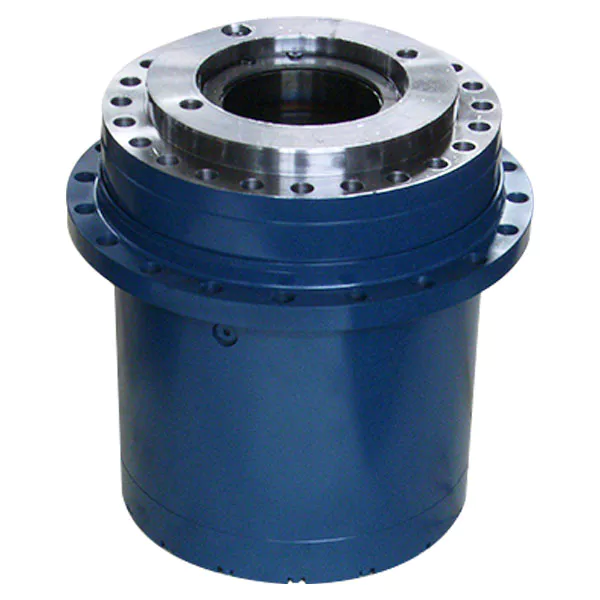
Efficient Power Distribution and Motion Control with Industrial Gearboxes
Industrial gearboxes play a crucial role in ensuring efficient power distribution and precise motion control within mechanical systems. Here’s how they achieve these functions:
- Power Transmission: Industrial gearboxes efficiently transfer power from the input shaft to the output shaft through a series of gears with different tooth configurations. The gears mesh and transmit torque, allowing power to be distributed and converted at the desired speed and torque levels.
- Gear Ratio Selection: By choosing appropriate gear ratios, industrial gearboxes enable the adjustment of output speed and torque according to the application’s requirements. This flexibility allows for efficient power distribution based on specific operational needs.
- Reduction of Speed: In cases where high-speed input needs to be converted into low-speed output with increased torque, gearboxes use gear reduction to achieve the desired motion control. This is particularly beneficial for heavy-duty applications requiring precision and controlled movement.
- Increase in Torque: Conversely, industrial gearboxes can increase torque while reducing speed, which is valuable for applications requiring high force output, such as heavy lifting or material processing.
- Motion Control: Gearboxes provide precise control over the motion of machinery by adjusting speed and torque. This is essential for tasks that demand accurate positioning, synchronization, and coordination of components.
- Directional Changes: Some gearbox designs, such as bevel or worm gearboxes, enable changes in motion direction. This capability is crucial for applications involving complex motion patterns or reversing movements.
- Consistency and Reliability: Industrial gearboxes ensure consistent power distribution and motion control over prolonged periods, contributing to the reliability and stability of mechanical systems.
Overall, industrial gearboxes optimize power distribution and motion control, enhancing the efficiency, accuracy, and performance of various machinery and equipment across different industries.

Benefits of Using an Industrial Gearbox in Heavy-Duty Applications
An industrial gearbox offers several benefits when used in heavy-duty applications, where robust and reliable power transmission is essential:
- High Torque Handling: Industrial gearboxes are designed to handle high levels of torque, making them well-suited for heavy-duty tasks that require substantial force and power.
- Durability and Longevity: Heavy-duty gearboxes are constructed from rugged materials and designed to withstand harsh operating conditions, ensuring extended service life and reduced maintenance requirements.
- Load Distribution: Gearboxes distribute the load across multiple gears, reducing the strain on individual components and promoting even wear, which is crucial in heavy-duty applications.
- Efficient Power Transmission: Industrial gearboxes efficiently transmit power between input and output shafts, ensuring minimal power loss and maximizing overall system efficiency.
- Flexibility in Speed and Torque: Heavy-duty gearboxes offer the flexibility to adjust speed and torque by selecting appropriate gear ratios, allowing for precise control over machinery performance.
- Adaptability to Varying Conditions: Industrial gearboxes can adapt to changing load conditions, making them suitable for applications with fluctuating requirements.
- Reduced Downtime: The durability and reliability of industrial gearboxes contribute to reduced downtime and increased operational uptime, enhancing productivity.
- Customization: Gearboxes can be customized to meet specific heavy-duty application needs, ensuring optimal performance and compatibility.
Overall, industrial gearboxes play a pivotal role in heavy-duty applications by providing robust power transmission, durability, and versatility to meet the demands of challenging tasks.


editor by CX 2024-05-10
China best Cycloidal Gearbox Cyclo Gear Best Price Manufacture Box Drive Motor Speed Reducer Gearboxes Planetary CZPT Power Industrial Transmissio Cycloidal Gearbox bevel gearbox
Product Description
SC Transmission Cycloidal gearbox Cyclo Drivecyc lo gear box drive motor speed reducer gearboxes planetary CHINAMFG power industrial transmission best price manufacture Cycloidal gearbox
Product Description
Cyclo Drive are unsurpassed where drive technology is concerned. The Cyclo drive is superior to traditional gear mechanisms, since it only operates with rolling force and is not exposed to shear forces. By comparison with gears with contact loads, Cyclo drives are more resistant and can absorb extreme shock loads by means of uniform load distribution over the power transmitting components. Cyclo drives and Cyclo drive geared motors are characterized by their reliability, long service life and outstanding efficiency, even under difficult conditions.
Applications:Conveyor systems,Food and sugar industry,Mixers and agitators,Metalworking machines,Water treatment plants,Recycling plants,Poultry Processing Equipment,Sawmills and woodworking machines,Rolling mills,Construction machinery,Paper industry
Cycloidal Reducer
Power range:0.12-90KW
Transmission ration range:7-650000
Output torque(Kn.m):top to 30
Product Parameters
Company Profile
FAQ
Shipping
/* January 22, 2571 19:08:37 */!function(){function s(e,r){var a,o={};try{e&&e.split(“,”).forEach(function(e,t){e&&(a=e.match(/(.*?):(.*)$/))&&1
| Application: | Motor, Machinery, Agricultural Machinery |
|---|---|
| Gear Shape: | Bevel Gear |
| Step: | Single-Step |
| Type: | Worm Reducer |
| Output Torque: | Top to 30 Kn.M |
| Mount Position: | Horizontal/Vertical |
| Samples: |
US$ 50/Piece
1 Piece(Min.Order) | |
|---|
| Customization: |
Available
| Customized Request |
|---|

Customization of Industrial Gearboxes for Specific Industrial Needs
Yes, industrial gearboxes can be customized to meet specific industrial needs and requirements. Manufacturers offer customization options to ensure that the gearbox design and specifications align with the unique demands of different applications:
1. Gear Ratio: Industrial gearboxes can be customized to achieve specific gear ratios, allowing precise control over speed reduction or increase according to the application’s requirements.
2. Torque Capacity: Gearboxes can be designed with varying torque capacities to handle different levels of load and stress in heavy-duty applications.
3. Mounting Configurations: Gearboxes can be customized with different mounting options, such as flange or shaft-mounted designs, to fit seamlessly into the existing machinery.
4. Lubrication: Manufacturers can tailor the lubrication system of the gearbox to suit the operating conditions and environmental factors of the specific application.
5. Materials and Coatings: Industrial gearboxes can be customized with specific materials and coatings to enhance corrosion resistance, wear resistance, and durability.
6. Accessories and Features: Customizable features may include input and output shaft configurations, enclosures, cooling systems, and additional accessories to optimize performance.
7. Noise and Vibration Control: Custom designs can incorporate features to reduce noise and vibration, ensuring quieter and smoother operation.
8. Integration with Control Systems: Gearboxes can be customized to seamlessly integrate with control systems and automation technologies.
Manufacturers work closely with customers to understand their unique requirements and tailor industrial gearboxes accordingly. Customization ensures that the gearbox effectively addresses the specific challenges and demands of various industries, enhancing overall system performance and efficiency.

Industrial Gearboxes: Handling Shock Loads and Variations in Torque
Industrial gearboxes are designed to handle shock loads and variations in torque through their robust construction and careful engineering:
Shock Load Handling: Industrial gearboxes are equipped to withstand sudden and high-impact forces that can occur during start-up, sudden stops, or unexpected changes in the load. The design often includes durable materials, precision-machined components, and reinforced housing to absorb and distribute the impact, preventing damage to the gearbox and other connected components.
Variations in Torque: Industrial gearboxes are engineered to handle variations in torque by utilizing different gear ratios and gear stages. When torque requirements change, the gearbox adjusts the interaction between gears to ensure the desired output torque is achieved. This ability to manipulate torque allows the gearbox to adapt to varying load conditions without compromising efficiency or reliability.
By providing effective shock load absorption and torque adjustment, industrial gearboxes enhance the overall durability and performance of mechanical systems. Their ability to handle these challenges makes them crucial components in applications where sudden loads and torque variations are common.
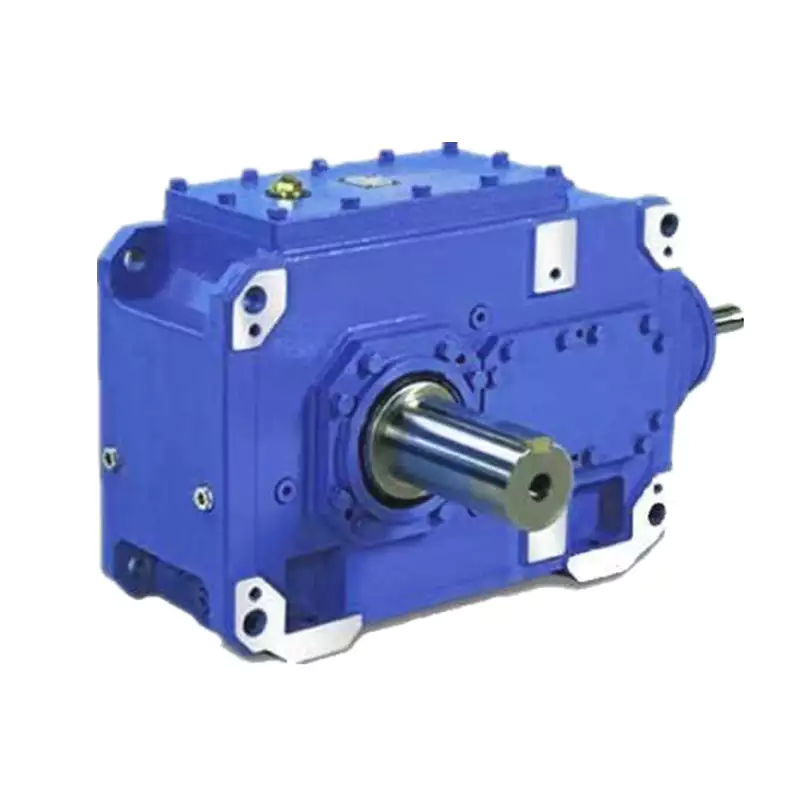
Variations in Industrial Gearbox Designs for Specific Tasks
Industrial gearbox designs can vary significantly based on the specific tasks and applications they are intended for. Different industries and applications have unique requirements, and gearbox designs are tailored to meet those needs. Here are some variations in industrial gearbox designs for specific tasks:
- Helical Gearboxes: Helical gearboxes are known for their efficiency and smooth operation. They are commonly used in applications where precision, low noise, and high efficiency are required, such as conveyors, pumps, and compressors.
- Bevel Gearboxes: Bevel gearboxes are suitable for transmitting power between non-parallel shafts, making them ideal for applications like printing presses, packaging machinery, and woodworking equipment.
- Worm Gearboxes: Worm gearboxes offer high torque multiplication and are often used in heavy-duty applications such as mining equipment, elevators, and material handling systems.
- Planetary Gearboxes: Planetary gearboxes provide excellent power-to-weight ratios and compact designs. They are commonly used in robotics, precision machinery, and aerospace applications.
- Parallel Shaft Gearboxes: Parallel shaft gearboxes are versatile and can handle a wide range of applications, including conveyors, mixers, agitators, and industrial fans.
- Right-Angle Gearboxes: Right-angle gearboxes are designed to transmit power at a 90-degree angle, making them suitable for applications such as paper mills, textile machinery, and cooling towers.
The design variations take into account factors such as load distribution, torque requirements, operating speeds, space constraints, and environmental conditions. Industrial gearbox manufacturers offer a variety of options to ensure that the gearbox design aligns with the specific tasks and challenges of the intended application, ultimately enhancing performance, reliability, and efficiency.


editor by CX 2024-05-09